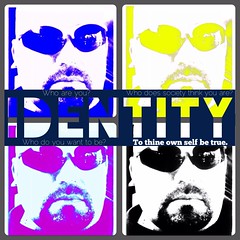| Identity: Who are you? (Photo credit: philozopher) |
My thoughts on the subject of atheist identity have changed over the years, but one constant is that I continue to believe that atheism is secondary to reason, skepticism, and critical thinking. I am an atheist because of these things and not the other way around. While atheism is an important part of my identity, I agree with those who suggest that it is not nearly enough. We atheists are virtually never content to define ourselves as just atheists. We are more than that. We are all more than that.
Atheist Identity
Whenever I spend a week or more offline (i.e., not blogging, reading other atheist blogs, or perusing assorted atheist or secular activist social media content), something always seems to happen to me. I discover that I rarely think about atheism until something happens that forces me to do so. And the type of thing that pushes me to do so always seems to be an over-reach by a Christian extremist seeking to impose his or her beliefs on others (i.e., a threat to separation of church and state) or an expression of religiously-motivated bigotry. Without these things, I suspect that I'd think about atheism or secularism rarely if at all.
The fact that these over-reaches and expressions of bigotry keep happening is what makes atheism and secular activism relevant to me. Evangelical fundamentalist Christians here in the U.S. refuse to stop seeking the enforcement of their religious beliefs through state power and appear uninterested in keeping their bigotry to themselves. They do not want a religiously pluralistic society where all belief systems can peacefully coexist; they seek to empower their own at the expense of the rest. As long as this remains problematic, atheism is going to be part of my identity.
But while atheism is part of my identity, it is a fairly small part. When I am offline for a while, I find that I end up thinking more about many other things than I do about atheism. I think about political issues in the U.S. (e.g., the rise of the surveillance state and our appalling willingness to surrender our privacy rights, the effects of increasing political polarization on the health of our system of government, our refusal to seriously consider universal health care). I think about the state of our news media and whether it is too late for us to recover from the damage done by conservative cable news and talk radio. I think about education and the barriers to the sort of educational reform we need. I could go on and on, but I think the point is clear: unless I have reason to focus on it, atheism is a relatively small part of what occupies my thoughts.
So why do I continue to write an atheist blog? First, the Christian extremists do not look like they are going to give up and go away anytime soon. As long as they continue to overreach and engage in bigotry, the need is there. Second, while atheism may be a small part of my identity, it is a part that I have few offline opportunities to explore. The things I write about here give me an opportunity to express myself that I rarely have offline. Third, I still enjoy it (most of the time). While my time away almost always convinces me that I need to take more frequent planned blog vacations, it also shows me that I'm not ready to quit just yet.
Post Atheism
Post-atheism means different things to different people. At an individual level, I think of it as the point in time when one no longer considers atheism to be an important part of one's identity. At the societal level, it would be the point in time when atheism itself becomes irrelevant because religious belief has faded into obscurity.
I do not consider myself a post-atheist, as atheism remains an important part of my identity even if it is only one part. I certainly do not see the U.S. as being very anywhere near post-atheism, but I recognize that my perception is going to be shaped by the region in which I live. I imagine that there are parts of the U.S. where it would be fairly easy to embrace post-atheism today.
A different way to think about post-atheism might be a reflection of changing priorities. For example, I could imagine reaching the point where I decide that skepticism, the promotion of critical thinking, and the like are so much more important than atheism that I should focus my efforts there instead. I am not quite at this place yet, but I can imagine that I might find myself there someday.
What I am clear about today, however, is that atheism is not enough for me. These other things (e.g., the promotion of reality-based education, critical thinking, reason, and skepticism) are too important to ignore. I have little interest in trying to make atheism into anything more than what it is; however, I am becoming increasingly clear that there is more that I would like to promote than just atheism.
